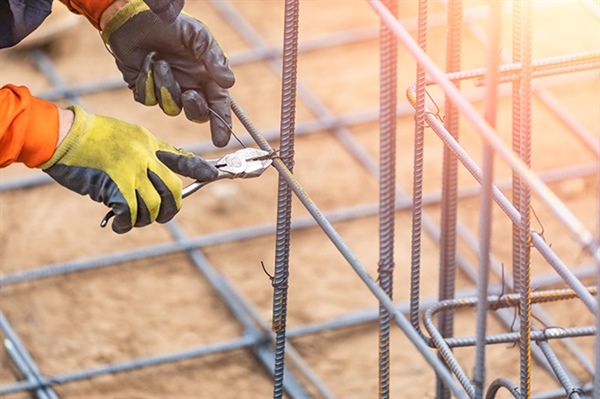Building the Future Part 2: Our Trust in Steel

Steel plays a pivotal role in shaping modern cityscapes, serving as the foundational pillar that supports the engineering feats of skyscrapers towering over urban jungles. Its unparalleled strength and flexibility have transformed architectural aspirations into reality, enabling the construction of iconic, skyline-defining structures that reach for the heavens.
From New York's Empire State Building to the Golden Gate Bridge, steel makes these marvels possible, upholding their grandeur and defying gravity. It's no understatement to say that without steel, the awe-inspiring vertical cities of today would remain a figment of imagination.
At Terradyne, our engineers understand that the future of construction is as strong as the materials we trust to build it. In the second part of our five-part series, we delve into steel's unparalleled role in modern architecture and infrastructure.
As a construction materials testing company, our commitment to precision and quality control ensures that every steel beam we evaluate meets the rigorous standards required for durability and safety.
Join us as we explore how steel's unique properties—its strength, versatility, and sustainability—make it an unrivaled choice for shaping tomorrow's skylines and bravely pioneering new realms of structural design.
Steel: What Cities Are Made Of
Steel is synonymous with strength and durability. Used extensively in structural frameworks, steel offers excellent load-bearing capacity and flexibility. Its high tensile strength makes it ideal for skyscrapers, bridges, and other demanding applications. Additionally, steel's recyclability aligns well with modern sustainability goals.
However, steel is also subject to corrosion and requires careful selection of grades and protective coatings to ensure longevity. Understanding these factors is crucial for maximizing the benefits of steel in construction projects.

Steel Properties
Steel's primary properties include tensile strength, ductility, and toughness. These characteristics make it suitable for a wide range of structural applications. Choosing steel grade and protective coatings is crucial for preventing corrosion and fatigue.
Testing steel for its mechanical properties and chemical composition is essential for achieving structural integrity and longevity, much like testing concrete for performance and safety standards. Proper testing can reveal potential issues before they become significant problems.
Typical Uses of Steel in Construction
-
Structural Frameworks: Steel is widely employed in constructing structural frameworks for high-rise buildings, industrial plants, and bridges. Its superior strength-to-weight ratio allows for the creation of slender yet robust structures capable of supporting substantial loads.
-
Reinforcement of Concrete: Steel reinforcement bars (rebar) are crucial for reinforcing concrete structures. They provide the necessary tensile strength to complement concrete's compressive strength, resulting in durable and resilient buildings and infrastructures.
-
Roofing & Cladding: Steel is often used in roofing and cladding systems due to its lightweight nature and resistance to weathering. Steel sheets and panels are easy to install and can be treated with coatings to enhance their resistance to corrosion and increase longevity.
-
Beams, Columns, & Girders: Steel beams, columns, and girders form the skeletal framework of many buildings and bridges. They offer exceptional support and flexibility, enabling the construction of wide-span structures and multi-story buildings without excessive column spacing.
-
Offshore Structures: The oil and gas industry relies heavily on steel to construct offshore platforms and rigs. Steel's resistance to harsh marine environments and its ability to withstand extreme pressures make it an ideal material for these applications.
-
Pre-engineered Buildings: Steel is the material of choice for pre-engineered buildings (PEBs), which are factory-built and assembled on-site. PEBs are economical, quick to erect, and customizable, making them suitable for warehouses, factories, and commercial buildings.
-
Rail Infrastructure: Steel is integral to rail infrastructure, including tracks, bridges, and tunnels. The material's durability and strength ensure trains' safe and efficient movement and accommodate heavy loads and high-speed travel.
-
Storage Tanks & Silos: Steel storage tanks and silos are used across various industries to store liquids, gases, and bulk materials. Their strength and resistance to corrosion are essential for ensuring the safe containment and long-term durability of storage facilities.
-
Reinforced Slope Stabilization: In geotechnical engineering, steel is used to stabilize slopes by installing soil nails, rock bolts, and retaining structures. These applications help maintain slope stability and prevent landslides and soil erosion.
-
Transmission Towers & Poles: Steel is commonly used to construct transmission towers and poles in the electrical power industry. Its ability to withstand environmental stress and high strength make it ideal for supporting heavy cables over long distances.

Types of Steel Testing in Construction
Ensuring the quality and reliability of steel used in construction projects requires a range of testing methods. These tests evaluate the mechanical properties, chemical composition, and structural integrity of steel components.
Tensile Testing
Tensile testing measures steel strength by applying a uniaxial force to a test sample until it fractures. This test calculates the yield strength, ultimate tensile strength, and elongation, providing critical data about the steel's ability to withstand heavy loads without failing.
Hardness Testing
Hardness testing determines the steel's resistance to indentation or plastic deformation. Common hardness tests include the Rockwell, Brinell, and Vickers methods, each providing valuable insights into the steel's durability and wear resistance.
Impact Testing
Impact testing assesses steel's toughness by measuring its ability to absorb energy during a rapid load application. Charpy and Izod tests are popular methodologies that help predict how steel will behave under sudden stress conditions, such as seismic events or collisions.
Chemical Analysis
Chemical analysis is crucial for verifying steel's composition and ensuring it meets specific alloy requirements. Techniques such as spectroscopy identify and quantify the elements in the steel, confirming that they align with project specifications for strength, corrosion resistance, and performance.
Ultrasonic Testing
Ultrasonic testing is a non-destructive evaluation method that utilizes sound waves to detect internal flaws, such as voids or inclusions, in steel components. This technique is essential for ensuring the integrity and safety of steel structures without damaging them.
Fatigue Testing
Fatigue testing examines how steel behaves under repeated cyclic loading, simulating real-world conditions where structures are exposed to continuous stress cycles. This test helps evaluate the steel's endurance limit and lifespan, preventing premature failures.
Corrosion Testing
Corrosion testing involves exposing steel samples to harsh environments to evaluate their resistance to rust and degradation. Accelerated tests, like salt spray or humidity exposure, provide insights into the effectiveness of protective coatings and the steel's suitability for specific applications.
On-Site Reinforcing Steel Inspections
Our engineering experts offer comprehensive on-site reinforcing steel inspections to ensure the quality and compliance of steel rebar used in construction projects. These inspections are crucial to verify that the reinforcing steel components meet the specifications and standards necessary for structural safety and performance.

Our experienced professionals conduct thorough inspections, including visual assessments, dimensional checks, and alignment verifications, to ensure the rebar is adequately placed, tied, and supported according to project requirements.
Additionally, our engineers assess the cleanliness and surface condition of the steel to detect any signs of corrosion or damage. By providing these meticulous on-site inspections, our construction materials experts help clients achieve compliance with building codes and ensure the long-term durability and safety of their construction projects.
Take Your Construction Project to New Heights With Terradyne
Quality materials and workmanship are the foundation of any successful construction project. Ensure your steel, concrete, and all other materials meet the highest industry standards with Terradyne’s comprehensive materials testing services.
Our expert engineers provide tailored quality control plans designed specifically for your project. We collaborate with owners, design teams, contractors, and city inspectors to confirm alignment with construction plans and specifications, and our team offers additional services from geotechnical engineering and soil reporting to environmental site assessments.
With precise planning, soil reporting, and thorough quality assurance from our experienced team, you can optimize your construction timeline and avoid delays. Choose Terradyne for fast, reliable steel and concrete testing, ensuring the longevity and safety of your projects.
Contact us today to get started on your land development or construction project!